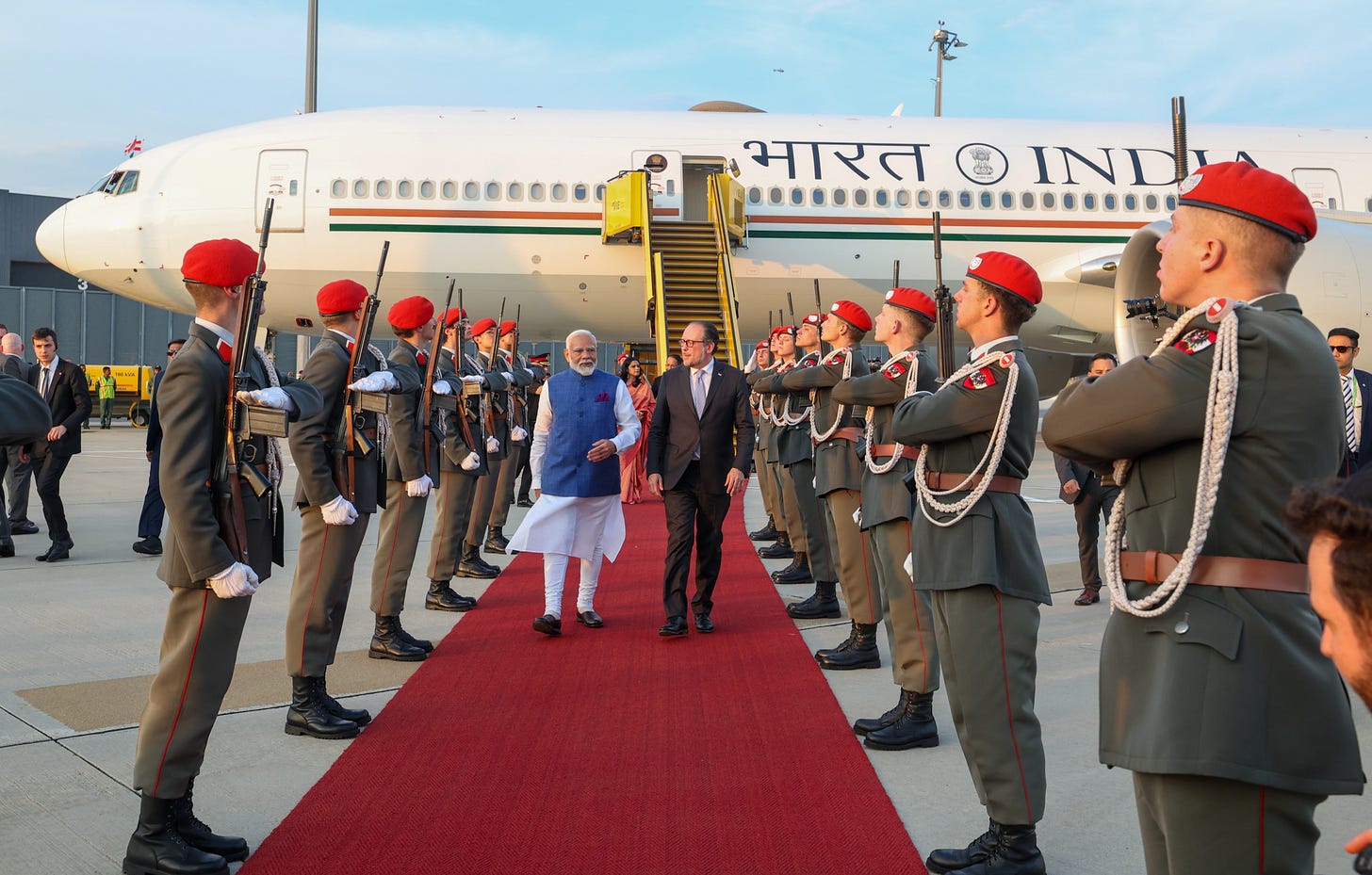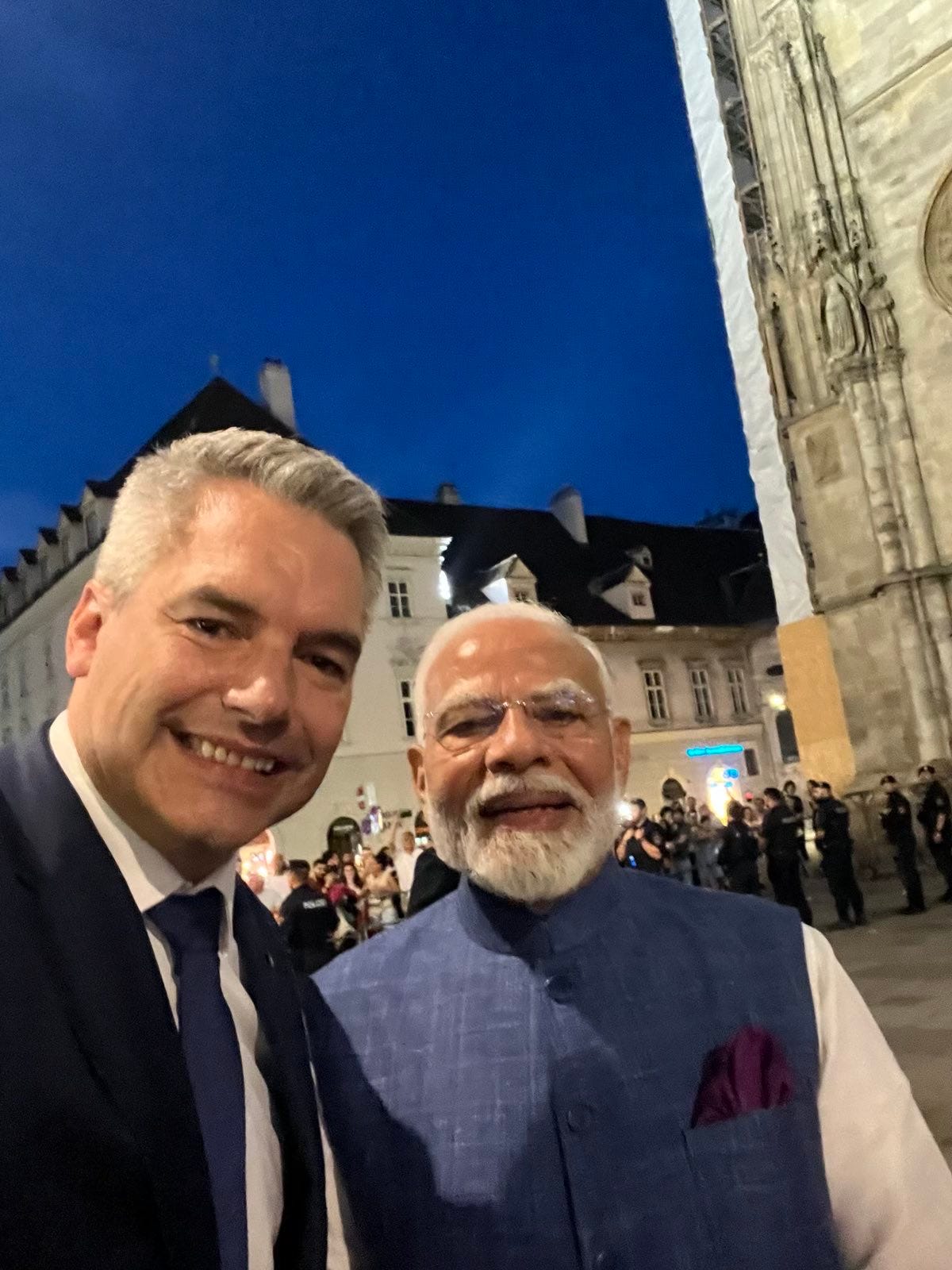PM Modi's Landmark Visit to Austria: Through a Bilateral and Geopolitical Lens
Immediately following his high-profile visit to Russia, PM Modi's trip to Austria, which maintains a neutral stance on Ukraine, helps reset India's diplomatic equation with Moscow and Western nations.
Historic Arrival in Vienna
Prime Minister Narendra Modi's visit to Austria from July 9-10, 2024, represents a historic event in the diplomatic relations between India and Austria, being the first such visit by an Indian Prime Minister since Indira Gandhi's trip in 1983. Upon his arrival in Vienna, PM Modi was warmly welcomed by Austrian Foreign Minister Alexander Schallenberg. This significant visit sets the stage for strengthening bilateral relationships and broadening cooperation in various areas.
Celebrating 75 Years of Diplomatic Ties
The significance of Prime Minister Narendra Modi's visit to Austria has been widely recognized by the Indian media as a pivotal moment for enhancing the bilateral ties and exploring new collaborative opportunities between the two nations. This visit also marks the 75th anniversary of diplomatic relations between India and Austria, initiating discussions to deepen cooperation in business, innovation, technology, and renewable energy. Highlighting the importance of this occasion, PM Modi described it as a "historic occasion," while Austrian Chancellor Karl Nehammer termed it a "significant milestone" in the countries' relationship.
Austria's Neutrality and Its Engagement with NATO
Austria upholds a policy of neutrality embedded in its constitution, which prevents it from joining military alliances, including NATO. Despite this, Austria has engaged with NATO through the Partnership for Peace program since 1995 and participates in the Euro-Atlantic Partnership Council, facilitating cooperation and dialogue. Additionally, Austria has contributed to NATO-led peacekeeping missions with UN mandates, such as the operation in Kosovo. The debate over potential NATO membership has intensified in Austria following the Russian invasion of Ukraine in 2022. However, both the Austrian government and public opinion currently favor maintaining a neutral stance.
Strengthening India-EU Relations
As a prominent EU member, Austria plays a pivotal role in enhancing India's strategic partnership with Europe. PM Modi's visit underscores India's commitment to deepening ties with European nations, addressing shared regional and global challenges, and diversifying partnerships within the European Union.
Balancing Geopolitical Relationships
Immediately following the high-profile visit to Russia, PM Modi’s engagement in Austria helps balance India's diplomatic stance between Moscow and Western nations. This visit demonstrates India's multi-aligned foreign policy, emphasizing its intention to maintain and strengthen relationships across the geopolitical spectrum.
Trade and Commerce
The economic, commercial, and tourism ties between India and Austria underscore a dynamic and growing bilateral relationship that bridges two continents with robust engagement. In 2022, the bilateral trade between these nations was evenly poised at approximately $1.2-1.3 billion each way, reflecting a balanced economic partnership. India's export portfolio to Austria is diverse, featuring broadcasting equipment, motorcycles, printed circuit boards, apparel, footwear, and organic chemicals, while Austria supplies India with artificial staple fibers, locomotive parts, machinery, electronic goods, and precision instruments. The relationship is further enriched by over 200 collaborations, including 100 technical partnerships and 60 joint ventures, predominantly in sectors such as steel, manufacturing, railways, transport, and metallurgy. This has facilitated the presence of over 500 Austrian companies in India, establishing more than 150 subsidiaries or joint ventures since 1991.
Two-way Tourism
Tourism also plays a significant role in fostering people-to-people connections, with Austria emerging as a favoured destination for Indian tourists—200,000 visitors in 2019 alone, many drawn by the picturesque locales featured in Bollywood films. Conversely, Austria sent 6,187 tourists to India in 2022, marking an increase from previous years. These interactions are supported by the 31,000-strong Indian community in Austria, comprising professionals and students, who serve as cultural and social bridges between the two nations. This vibrant exchange not only boosts tourism but also reinforces the deep-rooted ties and mutual understanding that define the India-Austria relationship, highlighting a successful model of international cooperation and cultural exchange.
Economic and Innovation Initiatives
Enhancing Economic Cooperation
Austria's role as a pivotal economic partner for India in Europe is underscored by robust trade relationships and the substantial presence of Austrian companies across various sectors in India. The focus of this partnership extends to critical areas such as infrastructure, renewable energy, technology, and innovation. Enhanced collaboration in these fields is poised to not only boost investments but also diversify supply chains, contributing to economic resilience and growth.
Promoting the Startup and Innovation Ecosystem
Moreover, the recent launch of the India-Austria Startup Bridge represents a significant advancement in connecting the startup ecosystems of both nations. PM Modi's current visit aims to further spotlight this initiative, fostering cooperation in technology and innovation that is essential for driving growth in the post-pandemic landscape, thereby reinforcing the economic and innovative bonds between the two countries.
Addressing the Ukraine Conflict
Strengthening India-EU Relations
As a key member of the European Union, Austria plays an essential role in fostering India's strategic engagement with Europe. PM Modi's visit exemplifies India's commitment to deepening ties with European nations, leveraging Austria's influence within the EU to enhance bilateral and multilateral cooperation. This visit provides a platform for both countries to tackle shared regional and global challenges, reinforcing the strategic axis between India and the EU.
Balancing Relations with Russia and the West
The visit to Austria follows closely on the heels of PM Modi's trip to Russia, highlighting India's adept balancing act in its foreign policy. Engaging with Austria allows India to harmonize its historical ties with Russia while reaffirming its commitment to forge robust partnerships within the European framework. This strategic interaction underpins India's broader policy of maintaining a multi-aligned stance, valuing diverse international partnerships.
Addressing the Ukraine Conflict and Promoting Peace Initiatives
Austria's balanced and neutral stance in the ongoing Ukraine conflict provides a unique diplomatic conduit for India. Discussions during PM Modi's visit are expected to explore the broader implications of the Ukraine war on European security architecture. Given India's amicable relations with both Russia and Western nations, this visit could pave the way for India to potentially assist in mediating and fostering dialogue, aimed at easing tensions and promoting stability in the region.
Cultural and People-to-People Ties
The vibrant Indian community in Austria, numbering around 31,000, plays a crucial role in bridging cultural and people-to-people ties. PM Modi's interaction with the diaspora is expected to energize these connections, reinforcing the cultural bonds between the two nations.
Curtain-Raiser: A Pivotal Moment for Bilateral Relations
Rejuvenating Bilateral Relations
Prime Minister Narendra Modi's visit to Austria marks a significant chapter in the evolving narrative of India’s foreign relations, reinforcing the longstanding ties between India and Austria. This visit serves not only to rejuvenate bilateral relations but also to address broader regional and global issues, expanding the scope of cooperation. Such engagements underscore India's assertive stance on the global stage, illustrating that it is far from being a satellite state of any major power, despite some commentary following India's involvement with the Quad.
Upholding Non-aligned Principles
This visit comes at a time when India is navigating complex relationships with major powers like Russia and China. Despite ongoing tensions with China, India continues to engage diplomatically, demonstrating its capability to maintain cordial relationship with reliable partners like Russia, independent of external influences. Additionally, India’s non-aligned stance on the Ukraine conflict, advocating for peaceful resolution, further establishes its commitment to an autonomous foreign policy that prioritizes strategic balance and peace.
Solidifying India’s Global Standing
The choice of Austria as a diplomatic partner is particularly telling. Austria’s maintained neutrality on Ukraine mirrors India’s approach, making this visit a strategic alignment with European and NATO entities while respecting mutual interests in maintaining sovereignty and neutrality. This visit not only reinforces India's position as a serious and independent player on the international stage but also sends a robust message globally: India's foreign policy is guided by its own national interests and sovereign imperatives, rather than aligning unequivocally with any dominant global bloc.





